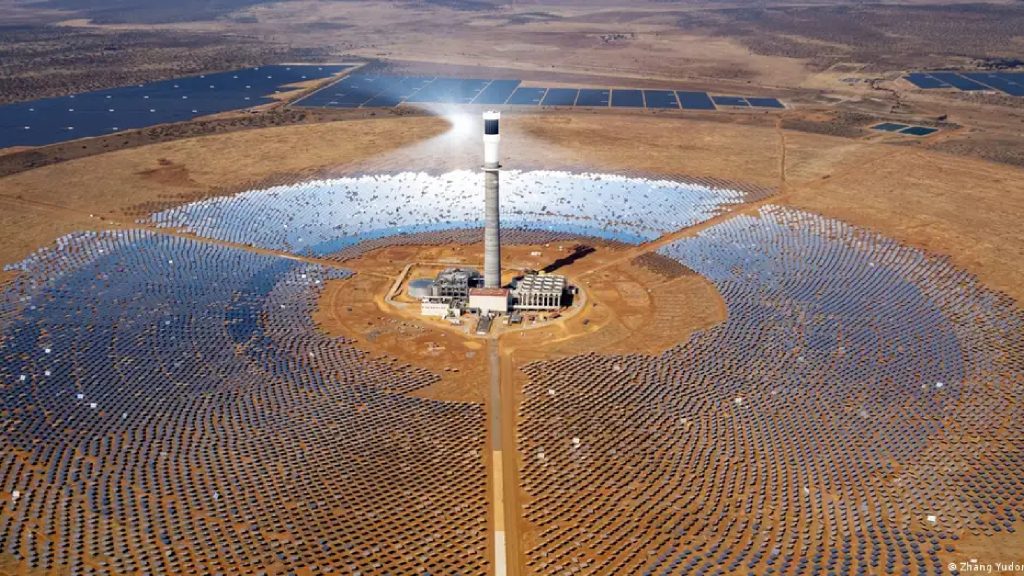 Credit: Zhang Yudong/Xinhua/picture alliance
Credit: Zhang Yudong/Xinhua/picture alliance An energy transition is changing the African energy landscape, endorsed by Chinese domination of the continent’s renewable infrastructure through Africa solar investments, and energy households and businesses abandoning already struggling grids for more affordable, independent solar systems, according to DW.
Mostly visible in South Africa, where the state-owned electricity public utility Eskom is struggling with catastrophic debt and operational collapse. Simultaneously, Chinese companies finance and construct large-scale solar farms for political influence and trade relationships.
In parallel, a separate consumer-led revolt is accelerating the grid’s decline.
African governments and energy partners are trying to increase capital as Chinese supplied photovoltaic systems accelerate adoption across the continent, changing how countries generate, store, and distribute affordable power.
Africa renewable energy transitions in years, driven by declining solar costs, rising fossil-fuel expenses, and a need for reliable power in both rural and urban regions.
Many countries previously limited by grid constraints and investment shortages are now scaling solar installations at unprecedented speed, positioning renewables as a core economic and energy solution rather than a backup option.
With battery storage, net metering policies, and increasing private sector financing supporting expansion, solar power in Africa is reshaping how homes and businesses power their daily lives, setting the stage for a broader clean-energy boom across markets.
China Accelerating Africa Solar Power Adoption
Africa private power generation prices for solar photovoltaic modules have fallen by 90% in 13 years, making solar one of the cheapest sources of electricity worldwide costing as little as $0.044 per kilowatt-hour, according to the International Renewable Energy Agency.
Despite abundant sunlight, Africa renewable energy policy has long been a minor player in global solar, holding only about 1% of installed capacity. The tide is turning. China has exported 15 gigawatts of solar panels to Africa in just 12 months, according to data analyzed by Ember.
South Africans are not just installing panels to escape the weight of relentless “load shedding” blackouts but rather making a set economic calculation. Residents have established that the best way to proceed is to generate their own power, due to its lower cost, compared to buying from the broken national system.
“Everybody seems to be very bullish about solar in Africa,” said John van Zuylen, CEO of the Africa Solar Industry Association (AFSIA). His organization estimates the South Africa solar installation may already have as much as 75 GW installed since 2000, including many small off-grid systems missing from official counts.
South Africa’s energy solar power adoption has reached a new tipping point, threatening to permanently unravel the traditional utility model by Eskom and redrawing the continent’s energy map.
China Africa clean energy collaboration with countries like Nigeria, Zambia, Rwanda, Senegal, Côte d’Ivoire, and Algeria are emerging as fast-growing markets. In Nigeria, where diesel generators have powered homes and businesses for years, solar has now become the cheaper option. Liberia expects its first large solar park soon, with 20 megawatts coming online by year-end, according to Emmanuel K. Urey Yarkpawolo of Liberia’s Environmental Protection Agency.
Trade tensions between China and the US also contributed to falling prices.
“The cost of equipment went down when the trade war started. The Chinese were desperate to offload,” said Managing Director of PFN Solar Systems in Zimbabwe, Fawen Nyakudya.
Kenya’s James Shikwati agrees the result benefits Africa, cheap access to renewable technology.
Battery storage and net metering are now unlocking even more value. “If you have a net metering system… you can install panels for the equivalent of 100% of your consumption,” van Zuylen said.
South Africa Energy Transition as Eskom Prices Climb
Even where grid access exists, Africa solar investment price pressure is driving change. South Africa independent producers, once dominated by Eskom, is put on the sidelines.
“What began as a response to unreliable electricity supply has become a core financial decision,” said Jaltech partner Jonty Sacks. A survey of more than 2,000 South African users found 93% of homeowners and 79% of businesses with solar are already saving money, while 82% of non-users plan to install within a year.
Yet, upfront solar panel exports to Africa remain a barrier, ranging from R55,000 to R250,000, though demand has triggered billions in private-sector financing.
South Africa solar energy market future is now diverging from Eskom’s control. Growthpoint, the country’s largest property owner, acquired a 30% stake in a hydro plant to power its estates. The City of eThekwini has approval to buy energy directly from independent producers, a step toward reducing grid reliance by 40% by 2030.
With falling prices, Africa decentralized energy solutions are faced with higher demand, and expanding storage capacity, solar is no longer a distant solution it is becoming the backbone of the Africa solar investment transition. As van Zuylen put it, once costs drop low enough, “it becomes like a no-brainer. You need electricity, you need it at a decent price – yes, you go for it.”
Inside Telecom provides you with an extensive list of content covering all aspects of the tech industry. Keep an eye on our Tech sections to stay informed and up-to-date with our daily articles.